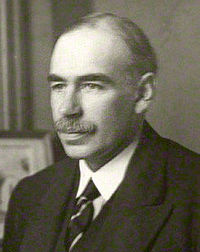
Back الآثار الاقتصادية للسلام (كتاب) Arabic Las consecuencias económicas de la paz Spanish The Economic Consequences of the Peace Basque Les Conséquences économiques de la paix French Le conseguenze economiche della pace Italian 平和の経済的帰結 Japanese As Consequências Económicas da Paz Portuguese Экономические последствия мира Russian The Economic Consequences of the Peace Swedish
 Title page for The Economic Consequences of the Peace first edition (1919) | |
| Author | John Maynard Keynes |
|---|---|
| Country | United Kingdom |
| Language | English |
| Subject | Economic |
Publication date | 1919 |

The Economic Consequences of the Peace (1919) is a book written and published by the British economist John Maynard Keynes.[1] After the First World War, Keynes attended the Paris Peace Conference of 1919 as a delegate of the British Treasury. At the conference as a representative of the British Treasury and deputy to the Chancellor of the Exchequer on the Supreme Economic Council he had publicly urged and secretly arranged on behalf of 'Rosie' Wemyss for a discontinuing of the food blockade of Germany but became ill and on his return found that there was 'no hope' of an economically sustainable settlement, and so resigned. In this book, he presents his arguments for a much less onerous treaty for a wider readership, not just for the sake of German civilians but for the sake of the economic well-being of all of Europe and beyond, including the Allied Powers, which the Treaty of Versailles and its associated treaties endangered.[2]
The book was a best-seller throughout the world and was critical in establishing a general opinion that the treaties were a "Carthaginian peace" designed to crush the defeated Central Powers, especially Germany.[3] It helped to consolidate American public opinion against the treaties and against joining the League of Nations. The perception by much of the British public that Germany had been treated unfairly was, in turn, a crucial factor in later public support for the appeasement of Hitler.
The success of the book established Keynes' reputation as a leading economist,[4][3] especially on the left. When Keynes was a key player in establishing the Bretton Woods system in 1944, he remembered the lessons from Versailles as well as the Great Depression. The Marshall Plan, which was promulgated to rebuild Europe after the Second World War, was similar to the system proposed by Keynes in The Economic Consequences of the Peace.
- ^ Keynes 1919.
- ^ Keynes 1949.
- ^ a b Harrod 1951.
- ^ John Maynard (2019). Michael (ed.). The Economic Consequences of the Peace: With a new introduction by Michael Cox. Palgrave Macmillan. ISBN 978-3-030-04758-0.
© MMXXIII Rich X Search. We shall prevail. All rights reserved. Rich X Search